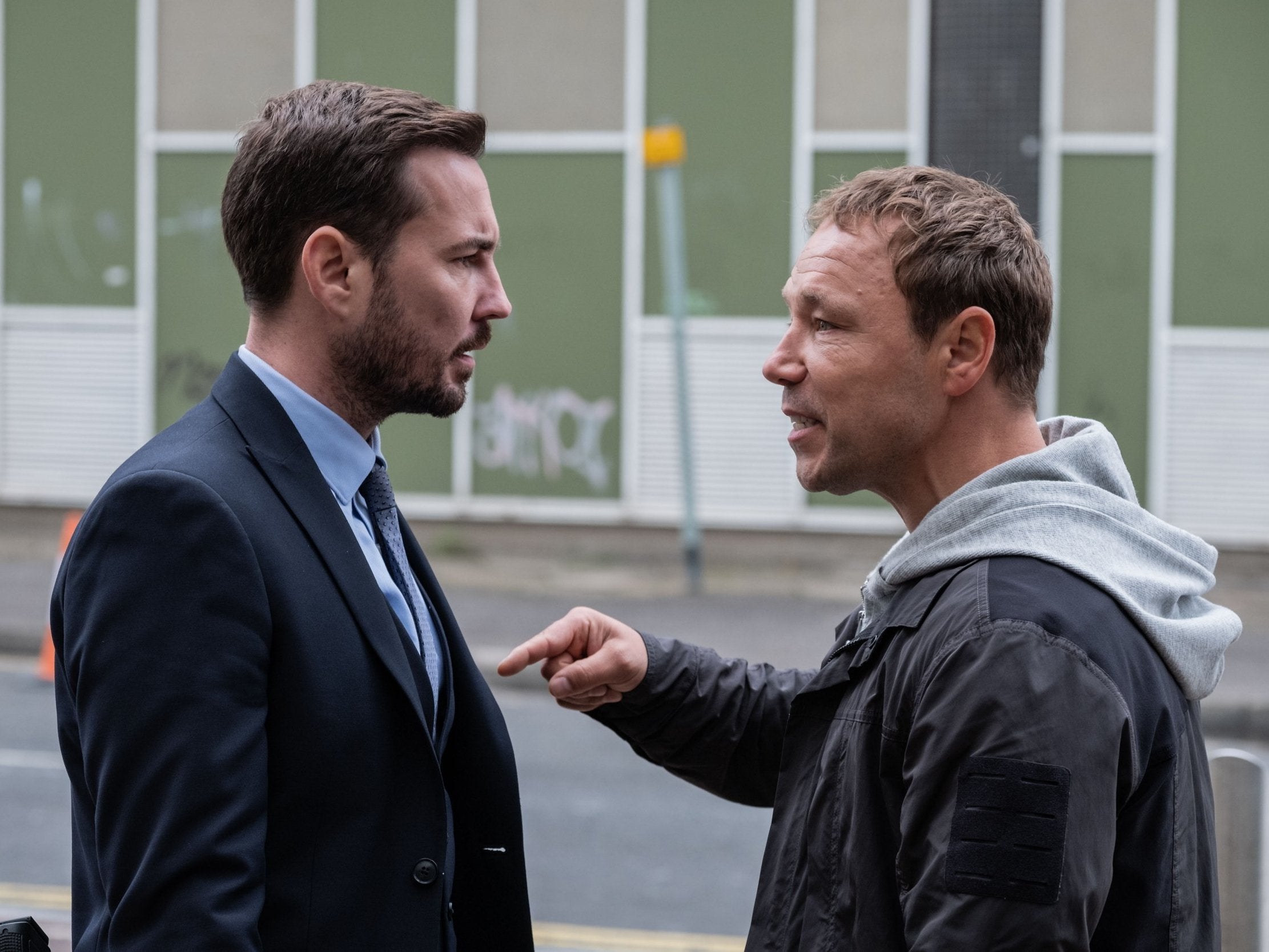The Independent's journalism is supported by our readers. When you purchase through links on our site, we may earn commission.
Why is the mastermind behind Line of Duty charging £80 for digital screenwriting lessons?
As the ‘Bodyguard’ showrunner reveals the tricks of his trade in a new online course, Kevin E G Perry learns why Isaac Newton and Albert Einstein are his unlikely storytelling gurus


Your support helps us to tell the story
From reproductive rights to climate change to Big Tech, The Independent is on the ground when the story is developing. Whether it's investigating the financials of Elon Musk's pro-Trump PAC or producing our latest documentary, 'The A Word', which shines a light on the American women fighting for reproductive rights, we know how important it is to parse out the facts from the messaging.
At such a critical moment in US history, we need reporters on the ground. Your donation allows us to keep sending journalists to speak to both sides of the story.
The Independent is trusted by Americans across the entire political spectrum. And unlike many other quality news outlets, we choose not to lock Americans out of our reporting and analysis with paywalls. We believe quality journalism should be available to everyone, paid for by those who can afford it.
Your support makes all the difference.When Jessica Raine joined the cast of Jed Mercurio’s smash-hit police drama Line of Duty for its second season, fans thought they were being introduced to an integral new member of beloved anti-corruption unit AC-12. Instead, her character DC Trotman hadn’t even made it through a single episode before she was unceremoniously bundled out of a hospital window – another surprise onscreen death added to the merciless Mercurio’s ever-lengthening rap sheet.
Fancy yourself ruthless enough to dream up a twist that shocking? If so, it’s time to put your money where your mouth is. Mercurio has turned teacher and is sharing the hard-won secrets of his 25-year career in a new online “Writing Drama for Television” course from BBC Maestro. For £80, you’ll get your hands on a 115-page PDF of course notes and access to 28 video lessons stretching over a total of seven hours. It’s a similar format to the screenwriting course taught by The West Wing creator Aaron Sorkin for rival e-learning platform MasterClass, although presumably with much less time dedicated to crafting the perfect walk-and-talk.
Mercurio’s shows – which also include the political thriller Bodyguard and medical drama Bodies – have won him millions of fans, even as critics have grumbled about his breathlessly twisting scripts stretching credulity. The gruff Lancashire bard has become something of a divisive figure, but the pertinent question is whether he can really teach you how to write a riveting top-flight drama in less time than it takes to watch Peter Jackson’s Beatles documentary Get Back. I dug out my notebook, hit record on my annoyingly whiny DIR, and settled in to find out.
Mercurio begins with a reassurance that it doesn’t matter if, like me, you’ve never darkened the door of a drama school. He hasn’t either. “I didn’t study creative writing; I didn’t study drama,” he explains during an early lesson. “I actually studied science at school and I studied medicine at university.” A bit of back-story: the young Mercurio was inspired to become a doctor by his love of medical dramas, and was soon shocked to find that the real-life work of an NHS junior doctor wasn’t quite as neat and clear-cut as it had appeared on television. “I had a baptism of fire,” he says. “What I encountered was nothing like what medical drama on TV had foretold.”
In the early Nineties, Dr Mercurio spotted a tiny advert in the back of the British Medical Journal seeking a professional who could advise on a new BBC series. He met the producers, thinking he could set them straight about the realities of hospital life, and they were so impressed with his insights they suggested he write the whole show. Cardiac Arrest ran for three seasons between 1994 and 1996, earning the scorn of the then health secretary Virginia Bottomley for its portrayal of incompetence and cover-ups while being heralded by junior doctors as the most realistic medical drama ever to hit screens.
Mercurio was still working as a doctor while it aired, and drew heavily on his own experiences and those of his colleagues. Critics who’ve scoffed at the more outlandish twists and turns in his scripts may raise their eyebrows at the maxim he subsequently derived about keeping his stories grounded: “One of the guiding principles, I think, is to invent as little as possible.”
Given this background, it comes as no surprise that Mercurio’s lessons feature a lot more scientific principles than soliloquies. There’s no mention of Shakespeare, but plenty of references to Isaac Newton and Albert Einstein. Characters and settings, he argues, follow Einstein’s theory of space-time. Just as matter bends space, so characters affect their setting. In the course notes, there’s a hand-drawn illustration of Sherlock Holmes bending space so much that all the other characters get sucked towards him. “Big characters, such as Sherlock, the Fonz (from Happy Days), or Captain Kirk (from Star Trek), bend space to a high degree, like a black hole,” he writes. In Mercurio’s scripts, space-time is evidently just as bent as the coppers.
You half expect Mercurio to don a lab coat as he explains his stories in terms of “loci” and “vectors” and applies Newton’s three laws of motion to the way his characters move through them. There’s a lot of talk about building to a critical mass and setting off chain reactions. Even if some of this scientific nomenclature can feel esoteric, the effect over the course of the lessons is to demystify the process of writing for television. Stories, for Mercurio, are not the product of divine inspiration but machines that can be built and fine-tuned by the application of careful and diligent craft. “Think more about perspiration than inspiration,” he recommends.

The sequence from his own work that Mercurio refers to most often is the bravura opening scene of Bodyguard, in which Richard Madden’s Sergeant David Budd talks down a suicide bomber by offering up details of his time serving in Afghanistan and sharing his distrust of the politicians who sent him there. It works because the stakes are so high, the emotions so raw, that as an audience we barely notice the barrel-load of exposition and character back-story we’re being fed. We’re too busy wondering if the bomb is going to go off. Sadly, this leaves no time to discuss my personal favourite Mercurio scene (the bit in episode one of Line of Duty when a mysterious intruder leaves a turd in Steve Arnott’s car – now there was a sticky whodunnit).

Watch Apple TV+ free for 7 days
New subscribers only. £8.99/mo. after free trial. Plan auto-renews until cancelled

Watch Apple TV+ free for 7 days
New subscribers only. £8.99/mo. after free trial. Plan auto-renews until cancelled
As well as showcasing Mercurio’s strengths, the lessons also illustrate the areas of screenwriting he’s less interested in. He’s not big on dialogue, for example, calling it “the least important” part of scriptwriting. Part of the reason he believes Line of Duty fans acclimatised so quickly to its acronym-laden talk of sending UCOs to investigate OCGs is that the words his characters say aren’t nearly as critical as everything else that’s going on in the story. “Much more important are creating great characters, having a really optimum setting and a really strong story line that drives forward,” he argues.
He’s also not one to get hung up on three-act versus four-act structure. He achieves the breakneck pace of his shows by simply dividing his scripts into 10-minute chunks. “If in 10 minutes nothing very significant happens,” he says, “then I know I’ve got a problem.” He boasts of purposely writing himself into corners so that he’s forced to think creatively to escape his own constraints, although the stock you place in that particular tactic may vary depending on how convincing you found some of Line of Duty’s more contrived moments. Mercurio has famously gone after critics on social media who had the temerity to criticise the morse-code-based revelation that the dastardly and mysterious H was in fact four separate people, so it should come as no surprise that there are no lessons here on humility, or indeed on Twitter etiquette.

The course wraps up with a section on career development, as Mercurio urges his students to start pitching agents and production companies with their hot-off-the-press ideas. I’m not quite there yet, but I have spent the last seven hours sketching out my own political drama, Party Politics. It’s about a bunch of incompetent government ministers who throw a clandestine party during a health crisis, and the police’s complicity in covering it all up. If there’s one thing I’ve learnt from my time in Mercurio’s classroom, it’s that it’s best to invent as little as possible.



Join our commenting forum
Join thought-provoking conversations, follow other Independent readers and see their replies
Comments